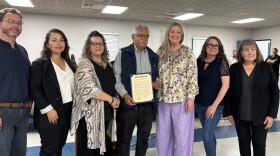True heroism. You can see it in their hands, brown and weathered. Their long fingers, slightly bent from the weight of the load they've had to carry. It's in their faces too, which exemplify a quiet dignity, and in their eyes, which glisten like gems from beneath the Pacific. An homage perhaps, to their time in Hawaii, Saipan, Guam and Okinawa. The crevices that line their faces and their somber, knowing smiles reveal a measure of the life they've lived.
They are three African-American gentlemen. One a bachelor, one a widower and one married now for 56 years. Grandchildren of slaves, born in the South, they've been at the forefront of history, breaking barriers and standing up for what is right amidst racism, discrimination and segregation. And they achieved this by serving in the U.S. Marine Corps.
They are original members of the Montford Point Marines: Retired Gunnery Sergeant, Dr. Carrel Reavis, Retired First Sergeant Joe Earl Jackson, and Retired Gunnery Sergeant J.T. Inge. Entering service during the 1940s, they were among the first African Americans to be permitted to take up arms for our country. Jackson and Reavis served in World War II, the Korean War and in Vietnam, while Inge served in the latter two.
These three brave men are Black History Heritage Month Local Heroes honorees, and listening to their stories of patriotism, valor and service in the face of prejudice, is indeed, humbling. Spending time with them means standing in the presence of greatness.
Unlike the Buffalo Soldiers and the Tuskegee Airmen, the Montford Point Marines are a little known part of our history. The group emerged from a 1942 directive from President Franklin Delano Roosevelt to the military to begin recruiting African Americans. The Marine Corps was the last to comply, and instead of sending the new recruits to San Diego or Camp Parris, South Carolina, the only two camps designated for training at that time, they were shipped to Montford Point in Camp Lejeune, North Carolina.
From 1942 to 1949, approximately 20,000 African American Marines did their basic training there, barred from even visiting Camp Lejeune unless accompanied by a white Marine. They became trailblazers, with their contribution to American history marred only by how they were treated.
“We really didn’t go in to make history,” Jackson candidly admits. “It was the thing to do.”
I caught up with Inge and Jackson at Inge’s modest home in the City Heights area. Inge and his wife, Maye, who passed away in 2001, moved into the home in 1964. The living room is filled with mementos and family photographs.
I met up with Reavis in a La Mesa senior living facility, where he currently lives with his wife. Having downsized in space, most of his memorabilia is stored in boxes, including a letter signed by President Barack Obama in recognition of the Congressional Gold Medal awarded to the Montford Point Marines in 2012. There are also framed photos displayed throughout the apartment, of him, his wife and five children, and of his parents and siblings,16 in all.
Though Jackson, Inge and Reavis haven’t spoken much about those days at Montford Point, they sat down to share their recollections of boot camp, deployment, and fighting for desegregation and recognition. Recalling this time in their life stirs up harsh memories, but they know how important it is for people to hear their story, and understand what they went through, so they plow ahead and speak frankly of the multitude of injustices they endured.
Boot Camp: Temper & Steel
When trying to explain his experience in the Marine Corps, Inge looks to the era of slavery.
“Slavery produced a by-product that stigmatized blacks,” opines Inge. “Blacks were considered to have strong backs and weak minds. We couldn’t think. We needed to be told everything that needed to be done. There was a resentment that this was an elite society preserved for whites only and that’s what happened in the Marine Corps. From 1775, when the Marine Corps was organized, it was an all-white, elite fighting unit, and there was a resentment from people who felt you were invading their territory.”

“We were called Negroes then and everyone who was Negro and drafted, was sent to Montford Point,” notes Reavis. "You couldn’t go anywhere else. Negroes had to go there for training, just like Tuskegee airmen had to go to Alabama for training. Even though we were all Marines we were kept separate. Montford was in the southern part of Camp Lejeune, this swamp part, I mean mud. We didn’t have barracks, we lived in huts, built from cardboard, painted green. Camp Lejeune had barracks but we had huts. It was located in the back woods, amid water, snakes and bears. It’s since been cleared off and drained. If you went there now you wouldn’t know it’s the same place.”
“The huts did not provide too much protection from the wind,” declares Inge, who arrived at Montford Point just after World War II. “I don't remember having windows but we had one door and one stove in the middle of the building, and bunks. You had a footlocker to put your clothes in. You were issued a razor, a mirror, two bars of soap, one to wash your clothes with. Nothing much else.”
"My father said there’s nothing you can’t do if you set your mind to it," Inge continues. "The easiest thing you can do is quit. When I went through boot camp I had this in my mind, not to give up no matter how rough. My drill instructor said, I want you to run out to the bay and get me a handful of water. And I was running out there to get a handful of water and run back. I never could make it. After so many trips, he told me, ‘You don’t have to do this. You can't do it.’ It wasn’t me who quit. I was determined, but he stopped me from doing it. Because of my father, I was prepared to meet any challenges they had there."
“Boot camp was a lot of hardship,” remembers Jackson with a distant look in his eyes, “But we were determined to pass. Our DI’s (boot camp Drill Instructors) would tell us, ‘You’re going to be the best Marines in the Marine Corps.’ It’s not because we were doing training that the other Marines were not getting. We were doing the same thing but longer and harder. Like the duck walk, which is exactly how it sounds. The Caucasian Marines may have done 50 at the most, but we weren’t done until we dropped. They worked us harder and longer, but they wanted us to quit. They said, you can leave anytime you want. We won’t even look for you.”
“We were not free,” says Reavis. “Because you couldn’t do this, couldn’t do that, couldn’t sit at the front of the bus, couldn’t go to a movie, couldn’t eat at a restaurant. You could go all over the country and not use a bathroom, eat at a restaurant, all this was denied. This is what we all went through, so we all trained together, ate together."
“At 17 you think there's no challenge too big that you can't overcome it,” notes Inge. “The things that were happening, the type of training, you had to march to the mess hall down a long road. By the time you got there, most of the time you were too tired to enjoy your food. All these things were part of the challenge you were faced with but because of the determination of most of the people that were there at the time, you laughed and joked. You'd laugh about it because it didn't dawn on you at the time that the pressure you were under, what was put on you, was making you a better person. Like temper and steel. When you came out of boot camp you felt like you could conquer the world. There was nothing you couldn't do.”
Next Up: Part II,’We Were Expendable’






